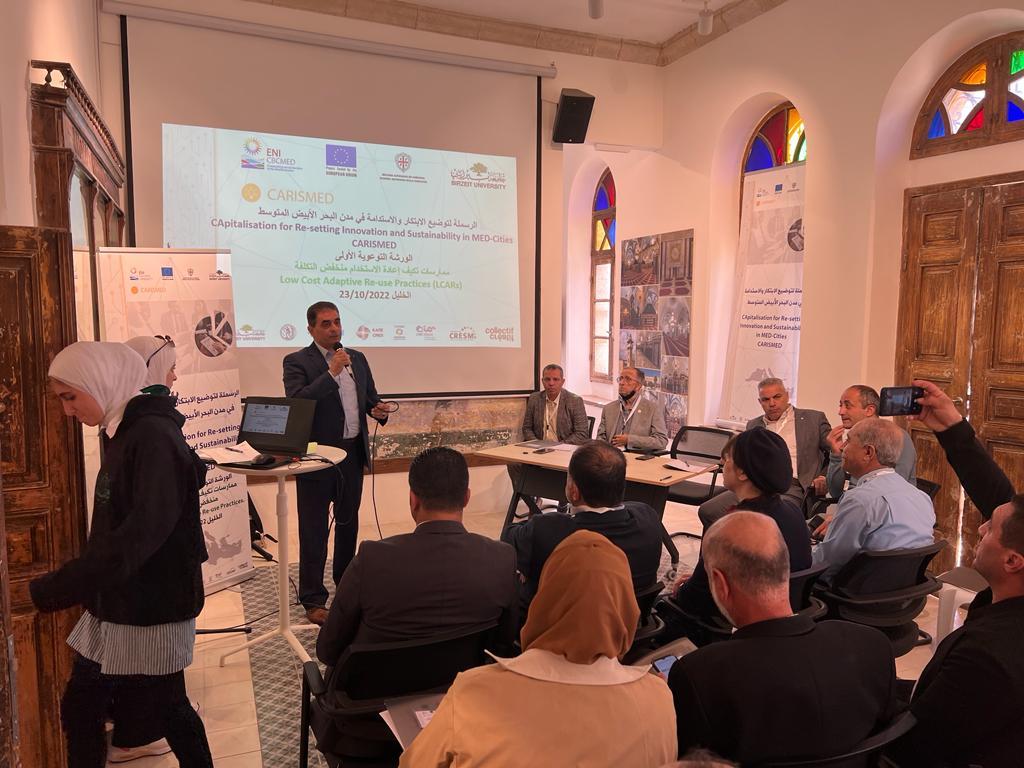Craftsmen and small business owners in Hebron make their way to success through the CARISMED project

To boost the performance and the products of Cultural and Creative Industries in Small and Medium-sized Enterprises (CCI SMEs) they need to adopt new methods, knowledge, and tools friendly to the environment where they live. Therefore, these two workshops have been conducted and implemented as part of the activities of the CARISMED project.
On November 23 & December 6, 2022 Birzeit University organized two workshops in Hebron city as part of the activities of the " CARISMED - Capitalization for Re-setting Innovation and Sustainability in MED-Cities. " in which the Department of Architecture and Urban Planning at Birzeit University, participates in cooperation with Hebron Municipality and Hebron Rehabilitation Committee. The first workshop was titled "low-cost adaptive re-use practices" and the second was entitled "SME'S clustering roadmaps and capacity building" World Café’.
The Lead Beneficiary Birzeit University (BZU) In Palestine conducted an awareness workshop in Hebron entitled: “Low Cost Adaptive Re-Use Practices” (LCARs). The main aim of this workshop was to dig deep in explaining the main aim and objectives of #CARISMED project, and also to explain the main practices of Low Cost Adaptive Re-use (LCARs) and how they will be used and applied in CARISMED project. This approach is closely related to innovation, sustainable development, circular economy, and an assessment of the needs for capacity building of craftsmen to promote innovative methodologies for recreating the working environment in the cities of the Mediterranean.
The workshop included many fruitful lectures conducted by experts in the fields of Innovation, Sustainability, Circular Economy, and Environmental Design Relationship with Low Cost Adaptive Re-use in Palestine. As well as Green Building, Low Cost Adaptive Re-use Practices Effects on Recycle and Development of Historical and Modern Buildings and Urban areas, and finally Applied Cases on Low Cost Adaptive Re-use at Local, National, regional and International Level.
The workshop has been attended by number of representatives from stakeholder institutions and small and medium enterprises such as Hebron Governorate, Hebron Municipality, Ministry of Economy, Hebron Chamber of Industry and Commerce, Environment Quality Authority, Ministry of Tourism and Antiques, Palestinian Engineers Association, Women Activity Society, Lecturers and Trainers, and SMEs and Craftsmen.
The second workshop was focused on the research methodology known as the “World Café” in Hebron, entitled: “SME’S clustering roadmaps and capacity building”.
The workshop aimed to deepen the understanding of the reality related to clusters of micro, small and medium enterprises operating in the current field of creative and heritage industries, in order to develop a strategic framework to improve it, and build the capacities of their members and those in charge of them, in addition toward an attempt to extrapolate the extent and depth of the participants' regarding understanding of smart practices, sustainable and environmentally friendly concepts and practices.
Several craftsmen from various trades participated in the workshop, in addition to many representatives from partner institutions, the Ministry of National Economy, the Environmental Quality Authority, the Chamber of Industry and Commerce of Hebron Governorate, and Al-Hajar Center from the Palestine Polytechnic University.
it is expected - based on the results of the workshop and the analysis made during the discussions - to come up with outcomes related to the problems of this sector and organize a development training plan for workers in this sector to advance it by developing their capabilities and developing the performance of the clusters to overcome the problems they face.
The workshops had been closed with significant discussion and recommendations by stakeholders and SMEs, and they agreed about the importance to link between innovation and heritage, and in this way, it promotes Hebron city as a historical and industrial city.
In conclusion, these workshops come as part of the project's activities, aiming to interact with craftsmen, and to develop a clear vision about the project's work to reach its goals, that is represented in a deeper understanding of the clusters, and building the capabilities, needs of society in the field of industries and developing their needs.
These workshops had been closed with significant discussion and recommendations by stakeholders and SMEs, and they agreed about the importance to link between innovation and heritage, and in this way, it promotes Hebron city as a historical and industrial city. As well as the SMEs gained and got the knowledge about the environmental performance of Palestinian vernacular architecture, the relationship between Environmental design and LCARs, the green building, how we can Improve health and social environment in the Traditional Residents in the Old City of Hebron, and how to assure the sustainability of buildings in a low cost and innovative ways.
For more information about the workshops activities please visit the links below:
• https://www.wattan.net/ar/video/388277.html?fbclid=IwAR20YqO8bzvedXFy2_zN-EibMp1BClPHGJs63OQzbV4IKmmdvhuJajn7_xM
• https://www.facebook.com/WattanNews/videos/520633246357263/
• https://www.dropbox.com/sh/zs56jvpds6egnu5/AABM8dcNe5eBswoODP4qcVEJa?dl=0
CARISMED is a 24 month-long project, with a total budget of €1.110.367,70 million and is co-funded by the European Union under the ENI CBC MED Programme 2021-2023. The project is led by Birzeit University - Palestine and has 8 partners from 6 countries of the Mediterranean area, namely Greece, Spain and Italy, as well as Palestine, Jordan and Tunisia.









